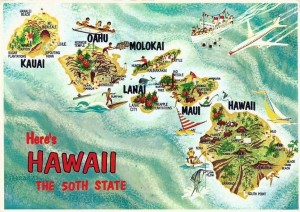Sometimes reality defies reason…
November 30, 2015 by GuyHeilenman · Leave a Comment
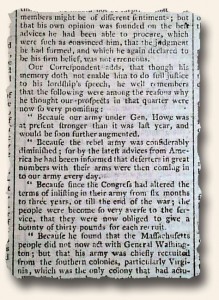 Just because the odds are stacked against us doesn’t mean we shouldn’t move forward. There are times when sticking to our guns is the right choice – regardless of our chances of success. This point was driven home in 1777 when Lord George Germaine presented his reasons why the American colonists had no chance of succeeding with their revolutionary effort before Parliament. If the American rebels had weighed the odds against them as itemized by Lord Germaine, they may have raised the white flag of defeat – and world history would have been forever altered. The full list of his reasons why the Americans would fail were printed in The London Chronicle of May 17, 1777. Thanks to our forefathers, they were driven by principle and not by the odds-makers of the day. Perhaps we should take a page from history and be driven likewise.
Just because the odds are stacked against us doesn’t mean we shouldn’t move forward. There are times when sticking to our guns is the right choice – regardless of our chances of success. This point was driven home in 1777 when Lord George Germaine presented his reasons why the American colonists had no chance of succeeding with their revolutionary effort before Parliament. If the American rebels had weighed the odds against them as itemized by Lord Germaine, they may have raised the white flag of defeat – and world history would have been forever altered. The full list of his reasons why the Americans would fail were printed in The London Chronicle of May 17, 1777. Thanks to our forefathers, they were driven by principle and not by the odds-makers of the day. Perhaps we should take a page from history and be driven likewise.
Lincoln’s “under the radar” proclamation for Thanksgiving…
November 25, 2015 by GuyHeilenman · Leave a Comment
Many are quite familiar with President Abraham Lincoln’s Thanksgiving Proclamation of October, 1863. However, few have read or heard of his similar proclamation from a few month’s prior which helped build the foundation for his famous October proclamation. The Star of the West, July 25, 1863 contains the text (see images below) of this earlier declaration calling for a day of thanksgiving and prayer – words which are apropos as we prepare (in the U.S.) to celebrate Thanksgiving. Note: We’ve included the text of this famous proclamation below.
October 3, 1863
By the President of the United States of America.
A Proclamation.
The year that is drawing towards its close, has been filled with the blessings of fruitful fields and healthful skies. To these bounties, which are so constantly enjoyed that we are prone to forget the source from which they come, others have been added, which are of so extraordinary a nature, that they cannot fail to penetrate and soften even the heart which is habitually insensible to the ever watchful providence of Almighty God. In the midst of a civil war of unequaled magnitude and severity, which has sometimes seemed to foreign States to invite and to provoke their aggression, peace has been preserved with all nations, order has been maintained, the laws have been respected and obeyed, and harmony has prevailed everywhere except in the theatre of military conflict; while that theatre has been greatly contracted by the advancing armies and navies of the Union. Needful diversions of wealth and of strength from the fields of peaceful industry to the national defense, have not arrested the plough, the shuttle or the ship; the axe has enlarged the borders of our settlements, and the mines, as well of iron and coal as of the precious metals, have yielded even more abundantly than heretofore. Population has steadily increased, notwithstanding the waste that has been made in the camp, the siege and the battle-field; and the country, rejoicing in the consciousness of augmented strength and vigor, is permitted to expect continuance of years with large increase of freedom. No human counsel hath devised nor hath any mortal hand worked out these great things. They are the gracious gifts of the Most High God, who, while dealing with us in anger for our sins, hath nevertheless remembered mercy. It has seemed to me fit and proper that they should be solemnly, reverently and gratefully acknowledged as with one heart and one voice by the whole American People. I do therefore invite my fellow citizens in every part of the United States, and also those who are at sea and those who are sojourning in foreign lands, to set apart and observe the last Thursday of November next, as a day of Thanksgiving and Praise to our beneficent Father who dwelleth in the Heavens. And I recommend to them that while offering up the ascriptions justly due to Him for such singular deliverances and blessings, they do also, with humble penitence for our national perverseness and disobedience, commend to His tender care all those who have become widows, orphans, mourners or sufferers in the lamentable civil strife in which we are unavoidably engaged, and fervently implore the interposition of the Almighty Hand to heal the wounds of the nation and to restore it as soon as may be consistent with the Divine purposes to the full enjoyment of peace, harmony, tranquility and Union.
In testimony whereof, I have hereunto set my hand and caused the Seal of the United States to be affixed.
Done at the City of Washington, this Third day of October, in the year of our Lord one thousand eight hundred and sixty-three, and of the Independence of the Unites States the Eighty-eighth.
By the President: Abraham Lincoln
William H. Seward,
Secretary of State
They put it in print… Not much hope for a reconciliation…
November 23, 2015 by TimHughes · Leave a Comment
 The “Weekly Museum” newspaper of New York City has in its August 30, 1800 issue, a: “Curious Advertisement” by a woman whose husband left her. She pulls no punches on how she feels: “Whereas my husband…a dirty Dutchman…did…absent himself in a clandestine manner from my bed & board without my approbation or any known cause of provocation on my part…I do…disown and reject him from this time forever…no one will use the last influence…to return him to me again as I am relieved from a detested nuisance…” with more (see).
The “Weekly Museum” newspaper of New York City has in its August 30, 1800 issue, a: “Curious Advertisement” by a woman whose husband left her. She pulls no punches on how she feels: “Whereas my husband…a dirty Dutchman…did…absent himself in a clandestine manner from my bed & board without my approbation or any known cause of provocation on my part…I do…disown and reject him from this time forever…no one will use the last influence…to return him to me again as I am relieved from a detested nuisance…” with more (see).
I don’t think there was much hope that marriage would be saved.
Archaeologists uncover secrets of historic Revolutionary War battle site…
November 19, 2015 by GuyHeilenman · Leave a Comment
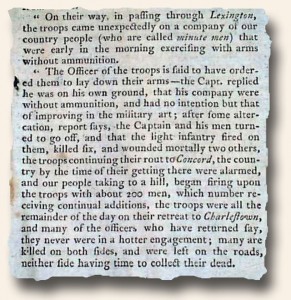 While reports of the events surrounding the skirmish at Lexington & Concord (1775) are few and far between, due to their undisputed importance, authentic newspapers with first-hand accounts are highly prized. A current archaeological effort in and around the area are sure to only increase public interest. The following article brings to light some of the recent finds:
While reports of the events surrounding the skirmish at Lexington & Concord (1775) are few and far between, due to their undisputed importance, authentic newspapers with first-hand accounts are highly prized. A current archaeological effort in and around the area are sure to only increase public interest. The following article brings to light some of the recent finds:
Archaeologists uncover secrets of historic Revolutionary War battle site
The Traveler… white man sentencing… six slaves conspiracy…
November 16, 2015 by The Traveler · Leave a Comment
I traveled to New York City by The New York Evening Post of November 15, 1815 where I found three men in North Carolina were tried and convicted for having cruelly whipped a black slave to death and one of the three men was sentenced to be hung. “…But as it was the first time a white man was condemned to death in the state for killing a slave, the governor thought proper to reprieve him when under the gallows…” (see image below).
In Maryland, six slaves had conspired to kill their master if any of them were to be whipped the next day. When Mr. Owings “called one of them to correct him”, their plan then ensued and a very brutal murder occurred. At the end of the report, all six were sitting in the new jail.
~The Traveler
Why Hawaii Became the 50th State…
November 12, 2015 by GuyHeilenman · Leave a Comment
Authentic newspapers reporting Hawaii Statehood, especially those from Hawaii, have been sought by collectors for decades. The fascination for “all things Hawaii” appears to have no end in sight. It is with this in mind we bring to you the following guest-post from Francisco Meza:
Why Hawaii Became the 50th State
Hawaii, one of the tiniest states and the only one made up entirely of islands, formally became the 50th state in 1959 (August 21, 1959). But Hawaii’s story starts long before 1959. Polynesians, the earliest inhabitants of these islands, settled here over 1,000 years ago. British explorer Captain James Cook, in 1778, named them the Sandwich Islands. Fortunately, this name didn’t stick. Shortly thereafter, American traders made a beeline for Hawaii’s sandalwood. From July 7, 1898, Hawaiian Islands were an organized incorporated territory of the US.
Why did it Take So Long?
The genuinely interesting question about the Hawaiian Islands becoming a state is the reason it took so long. Over sixty years elapsed from the time Hawaii had become a US possession before it became the 50th state. There were several Hawaiian petitions for statehood in the early part of the 20th century. These petitions were either denied or ignored altogether. Some in the US had felt that the Hawaiian Islands had no natural connection with the remainder of the mainland US. Most obviously, Hawaii wasn’t a contiguous territory. It lay 2,000 miles from the US coast.
American Plantation Owners Resented Paying Import Taxes
The clout of the American plantation owners in Hawaii resulted in its annexation in 1898. The protection of the plantations owners’ financial interests played a huge part too. They were keen on gaining exemption from paying import taxes for the sugar that they shipped to the mainland US. The plantation owners also wanted to safeguard their large land holdings from possible confiscation or annexation under a renewed Hawaiian monarchy.
The US Administration and Citizens Didn’t Favor Annexation of Hawaii
The sentiment in the US about the annexation of the Hawaiian Islands was always strong. The people felt it’d be an imperialistic, unjust, and hence, a most un-American move. Hawaii wasn’t only about sugar. It was an important coaling station for naval vessels, as well as, a potential major harbor. In the 18th and 19th centuries, Great Britain, Russia, and Japan had pressured Hawaii for trade concessions.
The Reasons for the Delay
At the time of annexation (1898), the monarchy had been in existence for just about a century. Originally, the monarchy had leveraged the firepower of the European sailors to consolidate power. An element of brutality was involved too. A high percentage of Hawaii’s Caucasian residents had been there for so long that they considered themselves native. Additionally, numerous Chinese, Portuguese, and Japanese immigrants had come to Hawaii as agricultural laborers and settled down permanently.
Polynesian Hawaiians Wanted to Maintain the Status Quo Because They Considered the Sizable Japanese Populace in Hawaii a Threat to Polynesian Prosperity
The six-decade reluctance to alter Hawaii’s status from a US territory to state lay both within the Hawaiian Islands and the US mainland. In the mainland, it concerned the uncertainty and fear about permitting electoral authority to any one ethnic group. It wasn’t merely ethnically Polynesian versus Caucasian.
In the Hawaiian Islands, some ethnically Polynesian Hawaiians didn’t favor the change to a US state from the existing US territory. This is mainly because, although they were comfortable feeling almost “American” as long as Hawaii was a US territory, they were apprehensive that’d change in case Hawaii became a state. After WWII had ended, the occupation of Japan by the Allies fuelled their fears even more. The Polynesian Hawaiians’ fears originated from a belief that the Japanese populace on the Hawaiian Islands (almost as high as 30 percent) would, in the event of universal franchise that statehood authorized, organize and vote itself into leadership. And Polynesian Hawaiians considered that the Japanese ascent to Hawaii leadership would result in an overall Polynesian descent in Hawaii.
Factors that Favored Hawaii Becoming the 50th State
At the instant of the vote to statehood, almost 90 percent of Hawaii’s populace comprised US citizens. The importance of Hawaii in WWII had secured its identity as 100 percent American both in the minds of the mainlanders as well as the Hawaiians. Additionally, persistent and successful lobbying of Congressional representatives in the initial phase of the contemporary Civil Rights Movement swayed enough members of Congress into accepting the Hawaiian statehood. They were prepared to overlook the islands’ racial makeup.
Why Didn’t Guam or America Samoa Become a State Too?
Almost 18 years after the Pearl Harbor attack, Hawaii, considered a distant frontier of American settlement, was declared a US state in 1959. Since the 1820s, European Americans had settled down in Hawaii and established English as a language. Additionally, an American-style legal system had been introduced early on, and the US dollar was the main currency.
In the case of American Samoa, indigenous Samoans make up almost 90 percent of the population. Hence, it’s unlikely that American Samoa will ever become a US state. In the case of Guam, the indigenous Chamorros make up almost 37 percent of the population. The remainder includes Filipinos, Chinese, Whites, Japanese, Micronesians, Vietnamese, Koreans, and Indians. It’s highly unlikely that Guam will become a US state in the near future.
Summary
After WWII had ended, Hawaiians themselves desired US statehood. Even during the 14-year intervening period before Hawaii was formally conferred statehood, the “49th State” Record Label was immensely popular in the Hawaiian Islands. Eventually, Alaska became the 49th state at the beginning of 1959. Several months later, Hawaii became the 50th.
If you are ever in Hawaii and want to learn about Hawaiian culture, take a few Hawaii Tours that encompass Oahu and the other islands. You’ll learn see where the Hawaiian battles happened, see the beautiful nature, and stop by Pearl Harbor.
© Francisco Meza
They put it in print… in two different editions…
November 9, 2015 by TimHughes · Leave a Comment
“Newsbooks” from Europe, those small pamphlet-looking periodicals which were the predecessors of today’s newspapers, have always been difficult to find. But rarely have we had a more intriguing issue than one recently added to our inventory, and its the back story which makes it interesting.
Rather than one, we have secured two issues of the “Mecurius Aulicus“newsbook, both of the same date, “The five and thirtieth Weeke” of 1643, one the “regular” Oxford edition, the other the secretly-printed and exceedingly rare London edition.
 This newsbook was created because of the English Civil War during the early 1640’s, as a means for the Royalist faction supporting King Charles I to promote their views in Parliament-held London. It was published in Oxford, the stronghold of Charles I at the time. Any person or any publication promoting the cause of Charles I would not have been welcomed in London. It was a short-lived publication which began to lose support from 1644 onward as the Royalist losses on the battlefield continued. This Oxford newsbook found it more & more difficult to obtain current news and issues became badly delayed. It finally ceased publication in 1645.
This newsbook was created because of the English Civil War during the early 1640’s, as a means for the Royalist faction supporting King Charles I to promote their views in Parliament-held London. It was published in Oxford, the stronghold of Charles I at the time. Any person or any publication promoting the cause of Charles I would not have been welcomed in London. It was a short-lived publication which began to lose support from 1644 onward as the Royalist losses on the battlefield continued. This Oxford newsbook found it more & more difficult to obtain current news and issues became badly delayed. It finally ceased publication in 1645.
But an intriguing article in Wikipedia adds an interesting tidbit to the history of this publication: “…The Mercurius Aulicus was printed in Oxford, which was at this time the Royalist capital…then smuggled into London where it was sold by local women, often at heavily inflated prices. It was also reprinted on occasion–albeit not necessarily accurately–by local sympathizers in London…”.
So as we see, there was also a secretly-printed edition done in London, with print runs which had to be exceedingly low. On the rare occasion we have had the opportunity to offer an issue of the Mercurius Aulicus it has always been the Oxford edition. Never have we seen a London edition. Until now.
The photos show the complete text of not only the “regular” Oxford edition but the very rare London edition as well. Comparing the two gives evidence to some subtle differences between them (embellishment at top of front page is different; heading type sizes are different; embellished first letter of ftpg. is different; dated headings on inside pages are different, etc.) Although I am struck but the considerable similarity between the two issues given they were printed on different presses in different cities, put side-by-side several differences are very evident.
Not only is this London edition very rare, but we were fortunate enough to secure the Oxford edition of the same date as well. If ever a pair of same-date newsbooks deserve to be kept together, here it is. A fascinating pair from an intriguing period in British history—and in newspaper history as well.
A November stroll thru time – 1765… 1815… 1865… 1915… 1945…
November 5, 2015 by GuyHeilenman · Leave a Comment
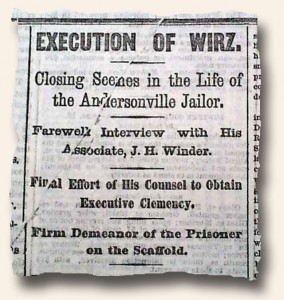 What news was reported in the month of November – 50, 100, 150, 200, and 250 years ago? Such a walk back through time via the eyes of those who read the daily and weekly newspapers of the period can be quite revealing. This is why we often say, “History is never more fascinating than when it’s read from the day it was first reported.” The following links will take you back in time to show the available newspapers from the Rare & Early newspapers website. There’s no need to buy a thing. Simply enjoy the stroll.
What news was reported in the month of November – 50, 100, 150, 200, and 250 years ago? Such a walk back through time via the eyes of those who read the daily and weekly newspapers of the period can be quite revealing. This is why we often say, “History is never more fascinating than when it’s read from the day it was first reported.” The following links will take you back in time to show the available newspapers from the Rare & Early newspapers website. There’s no need to buy a thing. Simply enjoy the stroll.
The Traveler… not quite the intended effect…
November 2, 2015 by The Traveler · Leave a Comment
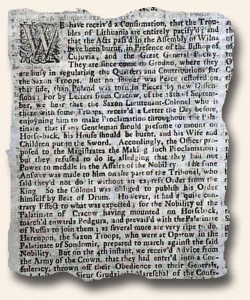 Today I traveled to London by the way of The Post Boy dated November 1, 1715. While peace in Lithuania now prevailed, Poland was being torn into pieces. A proclamation was made “…that if any Gentleman should presume to mount on Horse-back, his House should be burnt, and his Wife and Children put to the Sword… However, it had a quite contrary Effect to what was expected; for the Nobility of the Palatinate of Cracow having mounted on Horseback, march’d towards Podgura and prevail’d with the Palatinate of Russia to join them; as several more are very ripe to do…The Muscovites, to the Number of 20000 Men, are arrived within 8 Leagues of this City, and pursue their March, with all speed, for Pomerania.”
Today I traveled to London by the way of The Post Boy dated November 1, 1715. While peace in Lithuania now prevailed, Poland was being torn into pieces. A proclamation was made “…that if any Gentleman should presume to mount on Horse-back, his House should be burnt, and his Wife and Children put to the Sword… However, it had a quite contrary Effect to what was expected; for the Nobility of the Palatinate of Cracow having mounted on Horseback, march’d towards Podgura and prevail’d with the Palatinate of Russia to join them; as several more are very ripe to do…The Muscovites, to the Number of 20000 Men, are arrived within 8 Leagues of this City, and pursue their March, with all speed, for Pomerania.”
~ The Traveler




